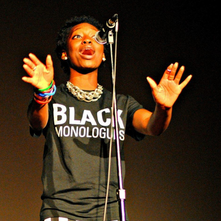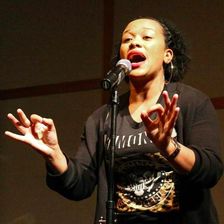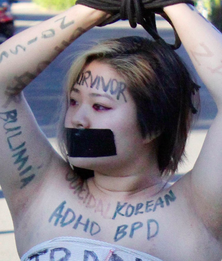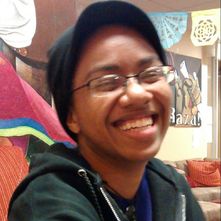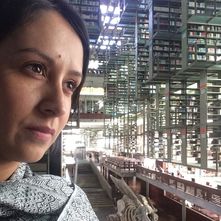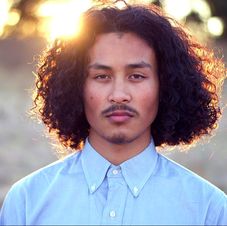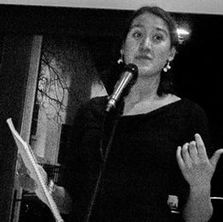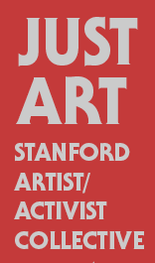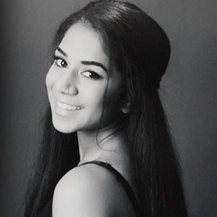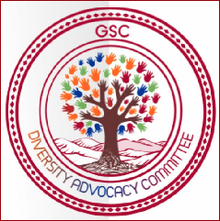About the Artists
|
Abisola Kusimo
Spoken Word Artist Abisola is a Nigerian-American slam poet veteran, competing in dozens of local and national competitions. She loves spreading messages of radical self-love, culture, and politicized bodies at any opportunity. Abisola also concurrently pursues her dream of becoming an Engineering Professor. abisolakusimo.com
|
|
Amber Walker
Spoken Word Artist Amber identifies first as a black queer woman and second as a spoken word poet. She has been practicing her craft for 7 years. Originally from New Jersey, she is at Stanford pursing her M.A. in education. Her work focuses on lived experiences of love, loss, and learning.
|
|
Colin Kimzey
Graphic Designer / Visual Artist Colin Kimzey is a mixed race Chinese American visual artist born, raised, and based in San Francisco, California. colinkimzey.com
|
|
K. Fryauff
Friend of Artist / Filmmaker Fryauff is a software engineer and a friend. She believes in the power of words, plastic, music, and mastery. In general, she hopes to be a reasonable enough person to be useful, or at the very least less harmful than your average biological warfare or the inevitable conspiracy theories that follow. web.stanford.edu/~kfryauff
|
|
Kari Barclay
Co-producer / Director Kari is a theater director and community organizer in Stanford's TAPS PhD. Past work in Durham, NC and Washington, DC has addressed gentrification, migration, and umbrellas. His next piece is an original play on the intersection of queerness and asexuality. karibarclay.com
|
|
Luz Jiménez Ruvalcaba
Poet Luz is a Mexican-born Chicana poet, educator, and scholar from Inglewood, California. Her work focuses on the experiences of the vulnerable and marginalized. She also likes to write about stray dogs. She is currently a PhD candidate in the program in Modern Thought and Literature.
|
|
Malcolm Lizzappi
Cinematographer Malcolm is an artist from Houston, currently at Stanford studying African and African-American Studies. They believe in daydreaming, strategy, and listening as means to create. instagram.com/alcolmm.
|
|
Mina Shah
Spoken Word Artist Mina is a spoken word poet who writes poems to people. Historically, most of these people have hurt them, but they are finding ways to write to people they love and hurt with as well. They have just finished an M.A. in African Studies and will be pursuing a Princeton in Africa Fellowship in Zambia starting in June.
|
|
Muzz Shittu
Artist / Producer Muzz is an artist from Northern Nigeria – by way of Amman, Jordan – who loves black music. He is the artist on the musical track "Bonsai," a song about Muzz's own reflections on blackness in America today. soundcloud.com/mzzza
|
|
Sage Isabella
Dancer / Choreographer / Poet Sage expresses herself in whatever medium possible be it dance or ceramics. She is currently writing a thesis on the ethical responsibility of tech companies to assist in poverty alleviation. sageisabella.us
|
|
Thao P. Nguyen
Co-producer / Solo performer / Writer Thao is a solo performer, writer, and producer. They make art about whatever pisses them off — racism, sexual violence, white power, hetero/cis-sexism, and people who don't say "please" and "thank you." thaosolo.com
|
About JUST ART
|
JUST ART: Stanford Artist/Activist Collective
JUST ART is a collective of artists, activists, artist-activists, and/or artivists. The collective's goal is to end oppression and to enact social justice by creating art and engaging in political action. We approach our work from an intersectional lens and center the stories of those who experience multiple vectors of oppression — racism, misogyny, hetero/cis-sexism, ableism, classism, xenophobia, religious oppression, etc. The 20 Minutes of Action performance is JUST ART's first production. JUST ART's second project is Marigold & Lavender, a project bringing together Transgender Day of Remembrance and Día de los Muertos (November 2017 at Stanford University's Nitery Theater). |
About SAJE
|
Stanford Sexual Assault Justice & Education (SAJE)
Stanford SAJE promotes inclusive conversations about sexual assault through peer-to-peer education and action. Our organization strives to uplift survivors and their communities by recognizing their diverse identities and backgrounds. In order to challenge sexual violence, we must also challenge classism, sexism, racism, ableism, homophobia, transphobia, and other intersecting forms of oppression. SAJE aims to equip every Stanford student with the compassion and knowledge to protect survivors and end campus sexual violence. The first production of 20 Minutes of Action (April 2017) was a collaboration between JUST ART and SAJE. SAJE facilitated the post-show event, offering the audience and artists a space for conversation, reflection, community building, and political action. |
|
Anjali Katta
SAJE Community Organizer Anjali has done women's rights advocacy in the past and currently focuses on sexual assault that women face, both on college campuses and in different countries across the world. She's specifically interested in learning more about removing barriers to reporting, especially in minority communities.
|
About the Sponsors
The following is the list of sponsors of the first production of 20 Minutes of Action (April 2017). Without the support of these organizations, the production would not have been possible.
|
Nitery Experimental Theater (NExT)
A project of the Stanford Theater and Performance Studies Department Nitery Experimental Theater (NExT) aims to present bold and relevant performance meant to challenge, transform, and cultivate meaningful artistic expression. NExT is also committed to diverse communities, aesthetics, and politics that exist within the Stanford community. By building connections between student-artists and the Department of Theater and Performance Studies (TAPS), NExT intends to foster performance as an integral forum for community conversation. Performance at NExT may be raw, political, provocative, or even playful. NExT is not a new home for performance; NExT uses performance to make Stanford a new kind of home. |
|
Diversity Advocacy Committee (DAC)
An initiative of the Graduate Student Council (GSC) The Diversity Advocacy Committee (DAC) organizes Diversity Month at Stanford each year. The DAC envisions a Stanford graduate student body that reflects the diversity of the general population. The organization's goal is to increase diversity within the graduate student community by initiating and facilitating events and advocacy efforts that achieve the following: (a) Increasing diversity of graduate student admission pool; (b) Building vibrant and supportive communities for graduate students from underrepresented groups; (c) Establishing and/or enhancing inter-community dialogue and interactions; and (d) Educating the broader graduate student population on relevant histories, activities and issues pertaining to underrepresented communities. The DAC aims to serve the graduate student community by advocating for the following underrepresented communities: University-recognized underrepresented racial and ethnic minority groups; First generation graduate students; Graduate students from low income backgrounds; LGBTQ graduate students; Graduate students with disabilities as recognized by the University; Graduate students with dependents; Female graduate students in traditionally male-dominated fields. |
|
Office of Sexual Assault & Relationship Abuse Education & Response
(a.k.a. SARA) The SARA Office facilitates the coordinated, comprehensive, and consistent response to sexual and relationship violence, stalking, and sexual harassment. With a focus on prevention education, intervention, and outreach, the SARA Office collaborates with all members of the campus community to increase awareness and promote a culture of safety and respect. Sexual and relationship violence, stalking, and sexual harassment are unacceptable and are not tolerated at Stanford University. The SARA Office strives to be proactive and progressive in our approach to addressing these issues. The staff is committed to uphold the rights of all students to live and learn in a healthy and safe environment. The SARA Office is here to serve the Stanford community. The office provides information about available options so that students can make informed decisions. The office's network of resources, both on and off campus, provides a wide range of support - including advocacy, counseling, medical care, and academic assistance. |
|
Associated Students of Stanford University (ASSU)
ASSU Executive, Sexual Violence and Prevention & Title IX The ASSU is over one hundred and ten years old and it is the only organization at Stanford of which every student is a member. The ASSU provides funding to over five hundred volunteer student organizations (VSO). These organizations in turn provide the majority of cultural, political, recreational and religious programming for the entire campus. The financial independence that the ASSU affords student organizations is one of the founding principles of the organization. The ASSU also works to represent the interests, needs and perspectives of Stanford students at every level of decision making within the university. We advocate on behalf of Stanford students on issues such as cost of living, diversity, student life and student activities space. Each year the ASSU strives to innovative new projects and create new services that will improve the quality of student life offered at Stanford. The ASSU served as the fiscal sponsor for JUST ART: Stanford Artist/Activist Collective for the 20 Minutes of Action performances. |
